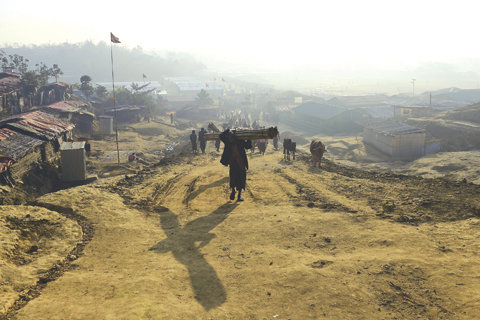Bangladesh delays Rohingya refugee return - 2nd such death in three days as tensions mount
 UKHIA: A Rohingya refugee man carries bamboo, used as a building material, at Thankhali refugee camp in Bangladesh’s Ukhia district yesterday. — AFP
UKHIA: A Rohingya refugee man carries bamboo, used as a building material, at Thankhali refugee camp in Bangladesh’s Ukhia district yesterday. — AFPBALUKHALI: Attackers yesterday killed a Rohingya representative in a Bangladesh refugee camp, the second such death in three days as tensions mount over the planned repatriation of some 750,000 refugees to Myanmar. Sources said the dead man Yusuf Ali was a camp leader at the Balukhali camp on the border with Myanmar. Mohammad Yusuf, a leader in the neighboring Thaingkhali camp, was shot dead last Friday. Yusuf Ali, 60, was stabbed to death, district police chief Iqbal Hossain said. Another police official described him as a Rohingya "majhi" or camp leader.
The Dhaka Tribune described the earlier victim, Mohammad Yusuf, as a pro-repatriation leader. His wife Jamila Khatun, 35, said some 20 armed and masked men stormed their home and shot her husband in the head. "He shouted 'Oh Allah!' and they shot him again in the mouth. He fell down," she said. "They spoke Rohingya. They were saying to my husband: 'Why did you put our name on the list?' They were furious," she added. She did not say which list the attackers were referring to. Bangladesh authorities have been trying to draw up a list of Rohingya, among nearly one million in camps on the border, who could be sent back to Myanmar.
Bangladesh has been besieged with an influx of more than 680,000 Rohingya since Myanmar's military launched the latest crackdown on the Muslim minority last August. Following an agreement with Myanmar, Bangladesh authorities had wanted to start the repatriations on Tuesday but have delayed the operation-saying they need more time to prepare. Local media and a Rohingya leader have linked the killings to fears of being sent back. Police have rejected any such connection. Hundreds of Rohingya have taken part in protests against repatriation in recent days. Local authorities in Cox's Bazar yesterday prevented hundreds of them from holding a rally at one large camp.
Return delayed
Meanwhile, the repatriation of hundreds of thousands of Rohingya Muslims who fled violence in Myanmar will not begin as planned, Bangladesh said yesterday, with authorities admitting "a lot of preparation" was still needed. Bangladesh had been due to start the huge process on January 23, after agreeing a two-year timeframe with Myanmar. But Bangladesh's Refugee Relief and Repatriation Commissioner Mohammad Abul Kalam announced yesterday there was much more work to be done. "We have not made the preparations required to send back people from tomorrow. A lot of preparation is still needed," Kalam said.
Since August last year around 688,000 Muslim Rohingya have escaped over the border into Bangladesh in the wake of a military-led campaign in Rakhine state that the UN says amounted to "ethnic cleansing". They poured into ill-equipped and overcrowded camps, bringing with them harrowing tales of rape, murder and torture at the hands of Myanmar's feared army or Buddhist mobs. After a global outcry, which included loud criticism of Myanmar's civilian leader Aung San Suu Kyi, the two countries agreed earlier this month that the refugees would be returned to Myanmar in a process they said would take around two years.
Rights groups and the UN have said any repatriation must be voluntary. There are reports that many Rohingya settlements have been burned to the ground. Bangladesh has sought to assure the international community that only those wishing to go back to their homelands in Rakhine would be sent back and that the process would involve the UN's refugee agency. But yesterday refugee chief Kalam said transit centres still needed to be built, and work remained to be done on the "rigorous process" of approving lists of those entitled-and willing-to return to Myanmar.
"Without completing this, we cannot send these people back all of a sudden. This work is ongoing," he said. He gave no revised start date but said two sites near the border had been identified for possible transit sites. Bangladesh was "very keen" for the process to begin as soon as possible, he said, but added much work was outstanding on Myanmar's side including housing reconstruction and safety arrangements. "Neither side is ready for the real movement to begin now," Kalam said.
Angry protests
The repatriation deal covers more than 750,000 refugees who have fled since October 2016, but does not include the estimated 200,000 Rohingya who were living in Bangladesh prior to that, driven out by previous rounds of communal violence and military operations. Refugees have protested at the prospect of return, with many saying they fear the campaign of atrocities is not over in Rakhine. Local authorities in Cox's Bazar in southeast Bangladesh yesterday stopped hundreds of protesters from marching on one large camp, with an organizer detained by the Bangladesh army, Rohingya leaders said.
In recent days refugees have gathered by the hundreds chanting slogans and holding banners, demanding citizenship and guarantees of security before they return to Rakhine. "It doesn't matter if it starts tomorrow, in three months or a year later," said 35-year-old Rohingya refugee Nurulla Amin upon learning that repatriation had been delayed. "What matters is our rights, our demands and if they are actually met." Five senior Rohingya leaders met UN special rapporteur Yanghee Lee in the Cox's Bazar district late Sunday and handed her a list of demands before repatriation would be considered. "We do not want to go back home because we have not got our rights," community leader Abdur Rahim, who met Lee during her tour of the camps said.- Agencies










